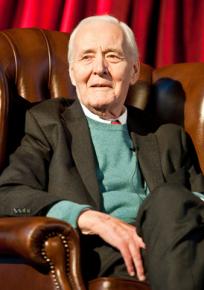Courageous and prophetic
British socialist , author of If I Am Not for Myself: Journey of an Anti-Zionist Jew, remembers Tony Benn, who died this week at the age of 89.
IT WAS inevitable that Tony Benn's death would be met with tributes from the political establishment to the effect that they admired him even if they didn't agree with him. But for those of us who did agree with him, his life and death mean so much more.
There's one phase of Benn's long career that liberal commentators still can't stomach: his leadership of the Labour left in the early '80s. The Bennite upsurge of that time is blamed for dividing the party, saddling it with "extreme" policies, and costing it the general election of 1983 (and in some accounts 1987 as well).
In fact, this was, for me, one of Benn's most courageous and prophetic moments.
I was one of many in those years inspired by Benn to become active in the Labour Party and to this day I regard myself as an unrepentant Bennite, early '80s vintage: What we tried to do, under Tony's leadership, was to reshape the party from the bottom up, to make it an effective instrument of working-class representation. And while we failed to do that, we came close enough to scare the hell out of the British ruling class, who put huge resources into destroying Benn and the Bennite movement. His courage in those days, under ceaseless attack from the media and the leaders of his own party, was exemplary, and enabled many others to stand their ground under pressure.

Looking back, we can now see this moment as the dawn of the neoliberal age. The choice to be made was between resisting that development, insisting that there was an alternative, or accommodating to it and designing policy and strategy accordingly. Most Labour MPs and trade union leaders, not to mention editorial writers, columnists and a significant section of the Communist Party, chose accommodation. Benn chose resistance, and in doing so placed himself at the head and heart of more than 30 years of often bitter struggles for the better world he insisted was possible.
Crucial to Benn's appeal was his revival of the radical democratic agenda in a labor movement long dominated by economistic and bureaucratic habits. This challenge was central to the Bennite movement, and made it a very different prospect from earlier Labour left formations. Tony invoked the heritage of the Levellers, Tom Paine, the Chartists and the suffragettes because he saw democracy in Britain as unfinished business.
Again and again, he stressed the importance of accountability, at every level of civic and economic life. He insisted that party leaders should be elected by party members, at a time when that was largely considered the prerogative of MPs, and that constituency members should have the power to remove ineffective MPs. As a whole, Bennism was very much about a revival of popular democracy, expressed in particular through the activities of left-wing local councils.
IT'S INTERESTING to remember how Benn arrived at his brand of radically democratic socialism. Usually it takes only a mere taste of office to turn politicians into servants of the establishment; Benn, in contrast, was radicalized by his experience in government (in the '60s and '70s). Increasingly, he came to see the necessity of far-reaching, systemic change. Defying convention, he became more not less radical as he grew older. And in this he was, again, an example to us all.
Bennism briefly raised the prospect of a genuinely left-wing Labour government and that terrified the powers-that-be (and those who wanted to join them). They hit back with everything at their disposal. Just now the media will not want to recall how they treated Tony in those years: He was derided as a lunatic and cast as a deadly threat to British society, smeared and misrepresented at every turn.
Much of what happened afterwards to the Labour Party can be seen as a prolonged backlash against the Bennite insurgency; the changes in the party's structures, the centralization of power, the marginalization of the membership, were designed to ensure it could never happen again. They aimed to make the Labour Party safe for capital, and in my view, over the long haul, they succeeded.
Benn warned early on that the acceptance of neo-liberalism by all the main parties was creating, in his words, "a crisis of representation." Today we live with the consequences of that crisis. That's why, in recent years, Tony's message has come to seem, to large numbers, more pertinent, more forward-looking, than anything on offer from the self-styled modernizers who cast him as a "dinosaur."
Benn was one of the great modern communicators of the socialist cause. The tributes to his eloquence only hint at what he did. He aimed always to clarify what seemed obscure or puzzling, to make plain what was hidden. He could delineate an injustice with a single phrase and make an unconventional position appear the epitome of common sense. In making his case he was concrete, concise, and intelligible to all. He appealed to our shared experience and aspirations. And he refused to be deflected by media ruses.
Of course, it was all lit up with Benn's warmth, humor and generosity of spirit. His was a socialism of the heart as well as the head, and no one who listened to him or worked with him could doubt that.
First published at Red Pepper. Benn photo by Chris Boland.


